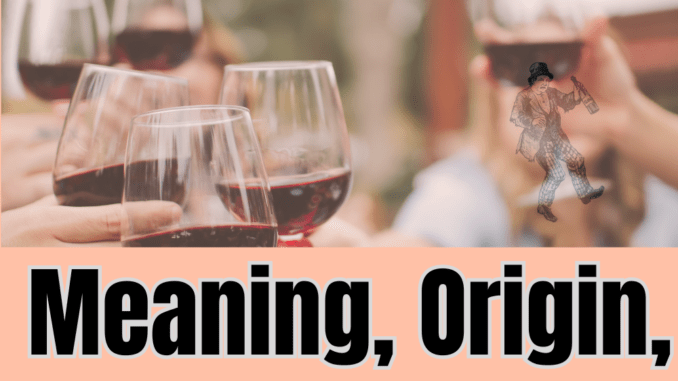
Drunk Words: Sober Thoughts or Slurred Secrets?
We’ve all been there: a night of laughter, drinks flowing, and suddenly a heartfelt confession spills from your lips (or maybe someone else’s).
The next morning, with a pounding headache and a hazy memory, you wonder – did that drunken declaration hold any truth? This age-old question, “Drunk Words: Sober Thoughts,” has sparked debate for centuries.
Is alcohol a truth serum, unlocking our deepest desires, or does it simply loosen our inhibitions, leading to a messy cocktail of emotions and unfiltered thoughts?
Let’s dive into the psychology behind this intriguing saying, separating fact from fiction to understand if those slurred secrets hold any weight in the light of day.
1. Drunk Words Are Sober Thoughts: Meaning, Origin, and Psychology
The age-old saying “drunk words are sober thoughts” has sparked debate for centuries. Does alcohol truly unlock our deepest truths, or does it simply loosen our inhibitions, leading to a messy mix of emotions and unfiltered thoughts?
Let’s delve into the meaning, origin, and psychology behind this intriguing concept.
Meaning
The meaning of “drunk words are sober thoughts” is straightforward. It suggests that when our guard is down due to alcohol consumption, our true feelings and inner thoughts bubble to the surface. In simpler terms, what we say when intoxicated reflects what we truly think when sober, but might be too afraid or reserved to express otherwise.
Origin
The exact origin of this saying remains shrouded in mystery. Some attribute it to the French philosopher Jean-Jacques Rousseau, known for his ideas on human nature. However, there’s no concrete evidence to support this claim.
The concept itself likely predates any single person or written source. Throughout history, societies have observed the uninhibited behavior of intoxicated individuals, leading to the belief that their words hold some hidden truth.
Psychology
From a psychological perspective, there’s some validity to the saying. Alcohol acts on the prefrontal cortex, the area of the brain responsible for judgment, impulse control, and inhibitions. When this region is impaired, we’re less likely to filter our thoughts before speaking. This can lead to the expression of hidden desires, frustrations, or even repressed emotions.
However, it’s important to consider the other effects of alcohol. It can distort our judgment, impair our communication skills, and cloud our thinking with emotional outbursts. As a result, “drunk words” might not always be accurate reflections of our sober selves.
The truth likely lies somewhere in between. While alcohol can lower inhibitions and allow for the expression of hidden feelings, it’s crucial to remember the distorted lens through which these feelings are perceived.
2. Do Drunk Words Really Mean Sober Thoughts?
Research offers a mixed bag. Some studies suggest that while intoxicated people may not be more truthful, they are more likely to disclose personal information they wouldn’t normally share. However, this information could be true or fueled by the distorted emotions alcohol can bring on.
The key takeaway? Don’t take everything said at a party at face value. Just because someone blurts something out doesn’t guarantee it reflects their sober thoughts.
3. Are Drunk Texts Real Thoughts?
The same principles apply to drunk texts. The ease of typing combined with lowered inhibitions can lead to uninhibited messages. However, drunk texting often lacks the nuance and clear communication of a sober conversation.
Those late-night texts might be fueled by genuine emotions, but the distorted thinking caused by alcohol can make them misleading or regrettable in the morning light.
4. What is the Drunk Truth Saying?
The “drunk truth” saying is closely linked to “drunk words are sober thoughts.” It suggests that inhibitions lowered by alcohol lead to a person’s honest opinions coming out.
This idea is particularly common in pop culture, where characters use drunkenness as a way to express hidden feelings. However, as discussed, the truth is more complex.
5. Do Guys Mean What They Say When Drunk?
There’s no simple answer to this. Alcohol affects everyone differently. Some people might become more emotional or even aggressive when intoxicated, leading to outbursts that don’t reflect their sober feelings.
However, for others, alcohol might loosen inhibitions enough for them to express genuine emotions they normally keep hidden. The best course of action? Talk things through when everyone is sober to understand what, if anything, was meant by those drunken words.
Read Also:
- Understanding Emotions in Psychology: Theories & Management
- Unveiling the Mystery of Love: A Guide to Theories of Love
- Marriage in the 21st Century: Meaning, Challenges, & Modern View
In conclusion, “drunk words are sober thoughts” is a catchy saying, but it’s not always accurate. Alcohol can loosen inhibitions and lead to expressing hidden feelings, but it can also distort judgment and lead to miscommunication. The next time you hear something profound (or embarrassing) from someone who’s had a few too many, take it with a grain of salt, and have a conversation when everyone’s sober.
Leave a Reply
You must be logged in to post a comment.